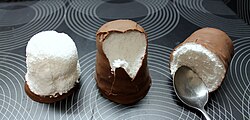
Borei Minei Mezonot blessing (commonly referred to simply as Mezonot) is one of the blessings over enjoyment in Jewish law. It is recited before eating baked goods (that are not considered bread) or cooked dishes made from the Five species of grain—wheat, barley, spelt, rye, and oats—as they are nourishing to humans. The blessing is also recited over cooked or baked foods made from rice.[1]
A person eating a pat haba'ah b'kisnin (sweet or filled pastry) recites Mezonot unless it constitutes a full meal.[1]
The after-blessing for most mezonot foods (excluding rice) is Al HaMichya.[1]
Text and translation
[edit]Hebrew
[edit]בָּרוּךְ אַתָּה יְיָ אֱלֹהֵינוּ מֶלֶךְ הָעוֹלָם, בּוֹרֵא מִינֵי מְזוֹנוֹת
Transliteration
[edit]Barukh attah Adonai, Eloheinu Melekh ha-olam, borei minei mezonot.
English
[edit]"Blessed are You, L‑ORD our God, King of the universe, Who creates various kinds of sustenance."
Minority and Secondary Ingredients
[edit]Any food that contains one of the five species of grain requires the blessing: "Borei Minei Mezonot".
Based on this, later halakhic authorities ruled that these grains are deemed important due to their nutritional value. Therefore, even if the grain is a minority ingredient (i.e. not the main component), it is considered the principal one if it contributes to taste (but not if it serves only as a binder or thickener), and the blessing remains Borei Minei Mezonot.

Contemporary Questions
[edit]- Krembo – This confection consists of three parts: cookie, whipped cream, and chocolate. The cream and chocolate require the blessing Shehakol nihye bidvaro, while the cookie part requires Mezonot. There is no consensus as to which component is the main one. Therefore, some rabbis advise separating the cookie and blessing Mezonot on it first, then Shehakol on the cream and chocolate.[1] Others rule that the cream and chocolate are primary and the cookie is secondary, so the blessing is Shehakol for the entire Krembo.[2] Some authorities rule that it depends on the individual's preference and intent.[3]
- Rice cakes and rice crisps – Cooked rice or baked rice flour products require Mezonot, while raw or puffed rice requires Borei Pri HaAdama. Since rice cakes are made by heating and puffing rice, opinions vary. A minority of authorities hold the blessing is Mezonot.[4] However, the majority rule it is HaAdama[5] or even Shehakol.[6]
External links
[edit]- Wikisource: The blessing on pastries
- Rabbi Eliezer Melamed's book Peninei Halakha, Hilchot Brachot: cakes, cones, and Krembo
References
[edit]- ^ a b c d For example: Rabbi Eliezer Melamed (Peninei Halakha, Hilchot Brachot 11:17); Rabbi Alexander Aryeh Mandelbaum, (VeZot HaBracha ch. 32); Rabbi Yitzhak Ratzabi (Shulchan Aruch HaKatzar, Siman 40:9); Rabbi Yisrael Samet ("What blessing do we recite on Krembo?", Kipa)
- ^ "מה מברכים על קרמבו?". www.hidabroot.org (in Hebrew). 2015-12-14. Retrieved 2025-07-16.
- ^ "יהדות, שיעורים, זמנים". אתר ישיבה (in Hebrew). Retrieved 2025-07-16.
- ^ Rabbi Binyamin Ovadia Forest (Pitchei Halakha 34); also attributed to Rabbi Yosef Shalom Elyashiv (Peninei Halakha Brachot 8:13)
- ^ Rabbi Ben Tzion Abba Shaul (Or LeTzion vol. 2, Siman 14:21); Rabbi Yitzhak Yosef (Yalkut Yosef Siman 208:9); Rabbi Shlomo Zalman Auerbach, Rabbi Chaim Pinchas Scheinberg, Rabbi Moshe Sternbuch, Rabbi Alexander Aryeh Mandelbaum (VeZot HaBracha p. 108)
- ^ Rabbi Mordechai Eliyahu (notes to VeZot HaBracha p. 361); Rabbi Yisrael Yaakov Fisher (VeZot HaBracha p. 109); Rabbi Eliezer Melamed (Peninei Halakha Brachot 8:13)